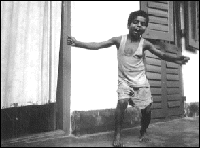|
|
|
監督・脚本:アルヴィンド・シンハ
Director, Script : Arvind Sinha |
アルヴィンド・シンハ(34才)は独学で映画製作を学んだ。1991年より映画を製作している。第一作はSeraikellaのChhauダンスについてのドキュメンタリー映画であり、広く評価された。偉大なるDhrupad歌手、Ustad Nasir Aminuddin Dagaraについての2作目はインド国内で賞を受けた。『アジット』はシンハの3作目の映画である。現在カルカッタ在住。自らプロデュースも手がける。『アジット』は、ライプチヒ映画祭(ドイツ)、ビルバオ映画祭(スペイン)でそれぞれ2つ、計4つの賞を受けた。インド国内でも受賞している。 Arvind Sinha (34) is a self-taught filmmaker. He has been making films for the past six years. His first documentary film was on the Chhau Dance of Seraikella, which was widely acclaimed. For his second film, on the great Dhrupad singer Ustad Nasir Aminuddin Dagara, he got the National Award. The Unconquerable is Sinha's third film. He is based in Calcutta and produces his own films. The Unconquerable has also won four major international awards, two each from the prestigious film festivals of Leipzig (Germany) and Bilbao (Spain) and the National Award in India. |
 |
|
| インドのカルカッタで家の下働きをする恥ずかしがりやのアジットは8歳。カメラは、仕事をまじめにこなし、食事を何よりも楽しみにしているアジットの日常生活をじっと見つめる。子どもを出稼ぎに出した貧農の父親や本人へのインタビューは矛盾に満ちた社会構造に光を当て、テレビの誘惑に引き込まれるアジットの純真な瞳は多くを語る。 | Featuring shy eight-year-old Ajit, a small village boy sent to work in a Calcuttan household, the unobtrusive camera watches him closely as he diligently goes about his daily chores and relishes the meals he is given. Interviews with his father, a poor farmer in the provinces, and Ajit himself, shed light on the hypocrisy hidden in a lopsided social structure. Ajit's innocent eyes, glued to the TV, communicate a multitude without words. |
|
|
|
|
監督のことば アジットは8歳、カルカッタのある家の下男。北ビハールの土地を持たない農民、Muneswarの9人の子どものひとりだ。この映画は、国民の大多数に、食料や住居、初等教育といった生活に最低限のものさえ供与できないというインドの制度の失敗を、独自の方法で表現している。 また、いわゆる経済の自由化と開放の初期段階における、人口のある部分の抑制のきかない消費生活の問題についても、この映画は言及している。メディアを通した娯楽産業という名のもとに著しく増大する俗悪趣味は、まさに経済の自由化の副産物である。これらすべてのことがらが、感じやすい心、特に子どもたちにどのような影響を与えるかを、この映画は映し出す。 外国から無数のテレビ・チャンネルが空から侵入してくる結果、この国の社会と文化にもたらされた変化について、この映画では痛烈なユーモアをもって検証している。 監督は、今日のインドの偏った発展に対する怒りを隠さない。アジットは児童労働者。彼の子ども時代は、大人の要求と偽善、そして不誠実な憲法からなる迷路のなかで、いたずらに消耗されてしまっている。 |
Director's Statement Ajit is an eight year old domestic in a Calcutta household. He is one of the nine children of Muneswar, a landless farmer in North Bihar. This film articulates in its own way the failure of the Indian system to provide the basics of life to a large majority of the Indian people; basics like food and shelter and primary education. At another level, the film takes up the issue of unrestrained consumerism in one section of the population in the wake of the so-called liberalization and opening up of the economy. The marked growth of vulgarity in the name of entertainment in the media is a fallout of economic liberalization. The film mirrors the influence of all this on impressionable minds, especially those of children. The invasion through the skies with the advent of innumerable foreign television channels and the consequent social and cultural changes taking place in the country have been examined in the film with biting humor. The director does not hide his anger at the lopsided development in the country today. Ajit is a child laborer whose childhood is lost in a maze of adult needs/hypocrisies and insincere Constitutional promises. |
